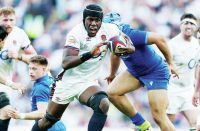
Brown acquitted himself well in the first Test of the summer tour against South Africa before being injured, and his form for Harlequins throughout last season almost demanded he played for England – and if it hadn’t been for Foden’s good form he would have played earlier.
Brown’s natural instinct is to counter-attack, which means bad opposition kicks will be punished. The Quins full-back isn’t the quickest, but he’s fairly elusive and generally escapes the first defender – which gives the supporting wingers the opportunity to assist and the forwards time to get back and help.
Goode is an impressive footballer, but again he is suppressed, like David Strettle, by Saracens‘ tactics. For him to get on the England radar is an achievement in itself, and it shows how much ability he has. He’s a very good all-rounder with a great skill-set, but he just doesn’t get enough opportunity to shine playing in the Premiership with Sarries.
Lancaster has a lot of wingers to choose from for Foden’s replacement, with Wade, and Gloucester’s May and Sharples being challenged by the likes of Ugo Monye, Strettle, and Tom Biggs, and the choice will reflect the management’s position in terms of how they want to develop the team.
Wade is in a good position, because he went on the summer tour, grabbed people’s attention, and is playing well so far this season. He has breathtaking speed, and put in space with a bit of room and a defender to beat I would back him to score every time. The Wasps wing doesn’t have Chris Ashton‘s hunt-the-ball and track-the-player radar in-built just yet – but that should come – and he’s not as good as Foden under the high ball. But not many English wingers are.
May is a fantastic player with great speed and swerve, who really likes to back himself to beat defenders. However, he just seems a little bit loose. By that I mean he might not always give the simple pass to beat a defender, because he’s more likely to take him on and be the star rather than pass – but what winger wouldn’t!
Monye is back and playing well in a good team, and he is a tried and tested international who would have no problem fitting in. By comparison, Strettle is out of favour. His transfer two seasons ago hasn’t put him in the media spotlight because Saracens don’t use their wingers to great effect in a straight-jacket game plan. Sharples is the unluckiest winger around at the moment and seems to be picking up unfortunate injuries at the wrong time. If he is fit and healthy he would be my pick. He reads the game well, has searing pace and loves to attack. I think it will be a choice between Wade and a fit Sharples, and both will do a good job for Lancaster and England.
Which brings us back to Foden, and why he will be missed. The Saints full-back has had a big impact playing for England since his first game against France in 2009 – and he had been knocking on the door for some time before that. Foden wasn’t backward in saying how good he thought he was, which is never popular with England coaches, especially when you’re a novice in a new position at a new club.
He had been mainly playing scrum-half for Sale before then head coach Philippe St Andre switched him to full-back, and he moved to Northampton probably believing he could get a steady place in their first team at No.9 and challenge for an England place. But Jim Mallinder agreed his best position was full-back, and my concerns then for him were that he could become just another utility back doing well, but not really holding down a permanent position on the field.
However, playing at full-back released Foden’s natural running instincts, and, with his partnership with Ashton catching the eye, his pace was used to devastating effect out wide. It was incredibly refreshing to see attacking play in a period of English rugby that was dominated by defences.
While Foden was getting great write-ups and comments from the media in England, Martin Johnson resisted selecting him. Only Johnno knows why. Presumably, he thought the time wasn’t right, because, when Foden did get his first cap, he fitted into Test rugby like he was born to play in that arena.
Foden’s biggest asset is his speed, combined with great timing, not just running onto the ball and going through the gap, but anticipating defences. His reading and understanding of the game is brilliant, and a lot of that comes naturally, plus his rugby education at scrum-half means he’s not scared of letting team-mates know what he wants.
During the summer Tests against the Springboks he played on the wing for England, and I suspect deep down he wasn’t overly pleased – but at least he was still in the team. Playing on the wing probably gave Foden a bit more freedom in terms of roaming and looking for the ball, while having him on the wing helped defensively because he knows what his full-back expects from him.
Now England have to do without Foden, and he will not be easy to replace.























